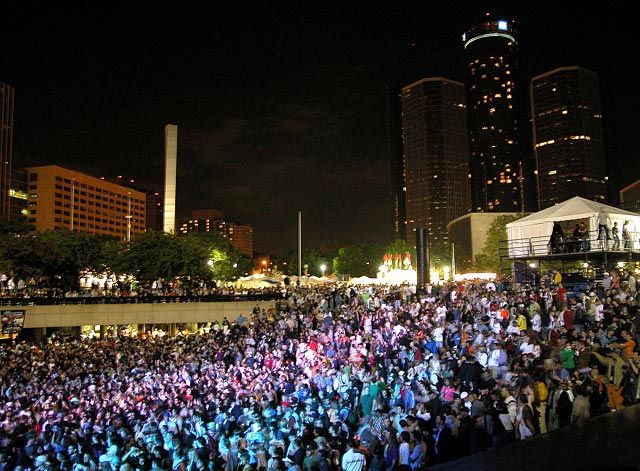The Origins of Detroit House and Why Its Still So Popular

Detroit House, also known as Detroit Techno, is a popular style of electronic music that was born in the Motor City. Once unique to Michigan, Detroit House’s blend of soul, synth and driving beats has made it a global phenomenon. But its worldwide popularity is due to more than just its sound. Detroit House is more than just a genre—it’s a cultural movement and a community that continues to captivate audiences worldwide. How did Detroit House go from basements to the biggest stages in the world? And what is its enduring legacy? We cover the history of the genre and its biggest milestones below.
The Birth of Detroit House
The roots of Detroit House go back to the early 1980s when a group of DJs and producers began experimenting with synthesizers in the city’s underground music scene. At the time, synthesizers were just becoming widely available, so the music these DJs were making was unlike anything people had heard before.
Juan Atkins, Derrick May and Kevin Saunderson, often referred to as the “Belleville Three,” were key players in shaping the genre. Using their synthesizers, they combined the sounds of innovators like Kraftwerk and Chicago’s Frankie Knuckles with Motown flair.
The Motor City’s musical legacy was in their blood, so it’s no wonder they infused funk, soul and disco into their electronic music. This would become the foundation of the Detroit House sound.
As if using synthesizers wasn’t innovative enough, these electronic pioneers also incorporated drum machines and sampling into their beats. Tracks like “No UFOs” by Model 500 and “Nude Photo” by Rhythim Is Rhythim helped launch the emerging Detroit House sound, setting the stage for a musical revolution.
The Detroit Sound
What does Detroit House music sound like?
Detroit House is described as soulful and deep, with an unmistakable sense of groove. It incorporates elements of Detroit’s musical history, resulting in a sound that is both nostalgic and futuristic. Using vocal samples from old soul and R&B records humanized the electronic beats, infusing them with emotion.
The blend of familiar melodies with new sounds also contributed to the rapid growth of the genre. Audiences recognized songs they loved, and now they could dance to them in a whole new way. It only took a few years for the underground Detroit sound to go global.
The Global Spread of Detroit House
As the 80s turned into the 1990s, Detroit House began to spread across the globe. DJs and producers from Detroit, such as Carl Craig and Jeff Mills, toured the world, introducing the Detroit sound to new audiences.
The genre’s fusion of experimental sounds and emotional depth served as a jumping-off point for electronic music production worldwide. It’s easy to hear its influence in the works of the biggest electronic music stars, including Daft Punk, Theo Parrish and Larry Heard.
Detroit House’s influence also planted seeds that would grow into popular House sub-genres, including deep house and tech-house. Tech-house, which combines house and techno sounds, has recently become the most popular electronic music genre in the world.
Detroit House as a Cultural Movement
Detroit House was about more than just the music, it was about unity, acceptance and the celebration of individuality. It provided a haven for people to express themselves freely, breaking down societal barriers through the power of music and dance. Detroit musicians were also famous for making free electronic music for the people. In fact, The Detroit Electronic Music Festival, one of America’s first electronic festivals, was free of charge to get in.
Clubs like The Music Institute played a crucial role in building a sense of community among fans and artists. This movement also promoted diversity and inclusivity within the electronic music scene. Detroit House events became safe places for LGBTQ+ communities at a time when they were heavily marginalized.
Detroit House Today
Today, Detroit House music is rarely referred to by name. It’s known simply as techno, but that still doesn’t do it justice. Detroit House has influenced many genres obscure and major, including EDM, which is also from Detroit. Its legacy is present in almost all of the electronic music modern fans love.
In the 2000s, Detroit House became less popular in its hometown, with fewer DJs and raves on the scene. But in recent years, it has experienced a resurgence, with a new generation of producers and DJs paying homage to its roots.
Artists like Moodymann and Omar-S are pioneering new Detroit House tracks while staying true to the roots of the sound. Thanks to the enduring popularity of house and techno, today’s Detroit House innovators shouldn’t have trouble carrying the genre forward.
Detroit House: The Roots of Electronic Music
Born in the heart of Detroit’s underground scene, Detroit House has grown into a global phenomenon. It’s part of Detroit’s rich musical legacy—the town that brought us Motown, Punk Rock, EDM and more. Detroit House continues to evolve today, leaving electronic fans, and fans of music in general, excited for the future of the Motor City’s sounds. Luckily it’s not the 1980s, so you don’t have to visit Detroit to hear what’s new in Detroit House. Instead, check out modern artists like Huey Mnemonic and Henry Brooks.






